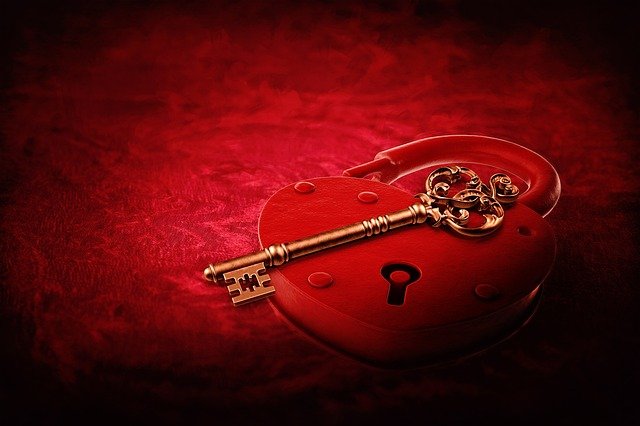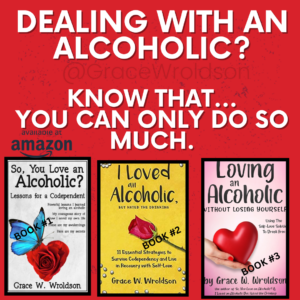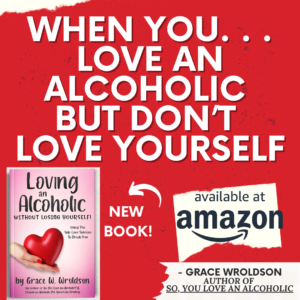3 Keys for Detaching from the Alcoholic
(To Save Your Sanity & Your Life)
Stop the Pain, Self-Harm, Headaches & Hurt.
Take Responsibility and Start Healing.
Restore Yourself to Peace and Sanity! *
By Grace W. Wroldson author of,
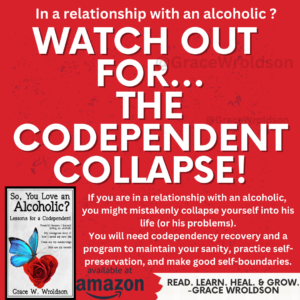
Book 1: So, You Love an Alcoholic?: Lessons for a Codependent
(paperback, Kindle, and Audible)
Book 2: I Loved an Alcoholic, But Hated the Drinking: 11 Essential Strategies to Survive Codependency and Live in Recovery with Self-Love
Book 3 – Loving an Alcoholic Without Losing Yourself!: Using The Self-Love Solution to Break Free
(Books are available at Amazon)
Have you asked yourself these questions:
- Where did I go? (Do you feel like you have lost yourself in the relationship?)
- Do my wants and needs matter to my partner at all?
- Is there a better life for me than this lonely/painful life with an alcoholic?
Do you want to:
- Stop the pain?
- Heal from hurt and betrayal?
- Restore your self-respect?
- Gain your sanity back?
- Create some inner peace?
Are You Toxically Attached to the Sick-and-Suffering Alcoholic?
If you’re a woman who loves an alcoholic man, you may be toxically attached. You may also have an unhealthy attachment to the outcome of the relationship. Not all relationships survive years of pain and betrayals. The fact is: Not all relationships are worth saving. Some relationships actually need to end and dissolve because it’s unhealthy for both people to continue. Is it time to get “real” with yourself about your relationship? Have you “codependently collapsed” your life into the alcoholic’s life and his problems? Are you ready to step into self-saving solutions? You hold the key! (Read my free blog 30 Signs & Symptoms of Codependency)
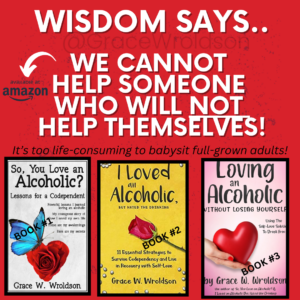
Detachment Is Key to Your Freedom!
If it’s time for you to detach and survive, try my keys, which are based on my 15-year experience with an alcoholic. For over a decade now, I’m happily detached. I saved my life starting with detachment and you can too! (See Disclaimer below.*)
Watch PART 1 VIDEO on YouTube for FREE
Buy my 3 Keys (with both videos) HERE.
—Grace Wroldson – mother, survivor, thriver, certified life coach, & author of several self-help books – available on Amazon.
*Disclaimer: These are helpful tips based solely on the author’s thoughts and opinions. The author is not a qualified mental health professional nor a crisis caseworker. She cannot give legal advice or appropriate counsel and is therefore not liable for any injury or harm. Please follow your doctor’s, therapist’s, counselor’s, and lawyer’s advice, as well as your own good common sense and intuition based on your unique case—to see if these tips could be helpful. Child custody situations may vary where some of these will not be applicable for your circumstance. Furthermore, court orders may dictate otherwise. Please use your own good judgment when reviewing this document. This is for personal self-help only. These were created from the author’s own lived experience and not based on any laws or rules of the courts. This is copyright-protected by the author and is not to be sold, distributed, or quoted without the author’s written consent.

Please like and share!

